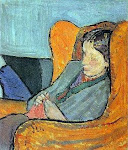
In anticipation of a summer trip, John and I are slowly trying to learn Italian. There are "Learn Italian in Your Car" CDs in my glove compartment; there is Rosetta Stone software on the computer ("So effective it's used by the U.S. State Department"); there are tiny labels affixed to objects throughout the house, telling me that lo specchio is a mirror and il W.C. is a toilet. My colleague Mike, who speaks a number of languages fluently and launches into them like a maestro when you least expect it, believes, quite rightly, that there is nothing like learning a foreign language to teach you the rules of your own. As a teacher of English, I see firsthand, daily, repeatedly, the extent to which native English speakers know so little of the tongue they call their own.
At the moment I am teaching an online grammar course, in which more than half of the students routinely answer more than half of the questions incorrectly. Yesterday, a student thought that "was" was an adjective. Another thought that "but" was a verb. (Perhaps she thought "butt," as in "head-butt"?) Even one of my English majors last week seemed stunned to learn that it's a convention in academic prose to italicize book titles. (She is a senior, by the way.) The college where I teach no longer has a foreign language requirement. It's a sad state of affairs.
One of my dearest friends, Valerio, is Italian, and he is the reason for both the Italian study and the Italian trip. At the risk of embarrassing him, his English is beautiful, and he learned it, he tells me, largely from reading English books and listening to English music. (Enya and Loreena McKennitt have gorgeous lyrics, for those of you non-believers.) We chat twice a week online, and in these chats he is nimble, he is quick. He can crack jokes, he can use puns. He uses punctuation the way one of my favorite professors, Erin McGraw, always said it should be used: like musical notation, telling the reader when to speed up, when to slow down, when to pause, and finally when to rest. Best of all, Valerio asks, when he feels he has made an error, for a correction. (His errors are rare.) When he writes to me, I feel more like a dumb American that at any other point, and I resent my shoddy education. It's too easy to write off Americans' lack of language skills to geography: unless you live in an area with a high percentage of Spanish-speakers, there is no real need to speak a second language in the continental U.S. And yet I feel that this encourages our latent ethnocentricism, as if we need anything else to encourage that. I grew up in Texas, and many of my school friends were Mexican, and I went to their houses and heard their parents' rapid-fire Spanish. Some of it stuck, and still sticks. In high school I took four years of Spanish, and one year of German in graduate school, but I've learned with time that language skills are like muscles: they will atrophy without exercise. Another colleague, Jim, who is in the Psych department and who studies memory, read that one of the best ways to ward off Alzheimer's disease is to learn a language or learn a musical instrument, for these skills utilize parts of the brain that are among the first to go, and it's best to keep them limber. On NPR a few months ago a man said that the human brain is neurologically capable of learning one new language per year, if the person puts in the time.
I envy my Italian friend many things: the fact that he lives in Europe, the fact that he's musical, the fact that he's cute. But one of the things I envy most is the fluidity with which he cuts back and forth between Italian and English, the same way in which he slices through the water as a swimmer. With Valerio I will see Venice, parts of Tuscany, Florence, and Rome, and while I do not expect to be fluent by July, I would like to be able to do more than ask for directions, or for the nearest W.C. I will doubtless lean on Valerio for the complexities, but between now and then, I will do my best to put in the time. And that's no bugia.


4 comments:
Yur engrish vury pritty. I sympathize with what your saying. I've always been poor at learning new languages. Plus, my grasp of English isn't all that hot either.
After four years of Latin, I initially lauded the Mount for not having a foreign language requirement. As a sophomore with little more to do in his major except for the required classes that come once every two years, I miss having the option.
Maybe I can hit up Mike for an independent study.
Well, as a matter of fact, you embarassed me!
Eheh... thanks for saying that, D -- even though I really do think my English could be MUCH better.
I'll write later.
Let me just tell you this, now: I'm TERRIBLY disappointed with Brit's new video.
I had a year of Spanish in High School and a year in College, yet I remember next to nothing. When we were in Mexico last week I really wanted to talk to people in Spanish but could not. I’m thinking of re-learning it with one of those language courses we have at the store-maybe make it a goal to learn as much as I can before we go back. (Hopefully in a year or two)
Chuckwilson
Post a Comment